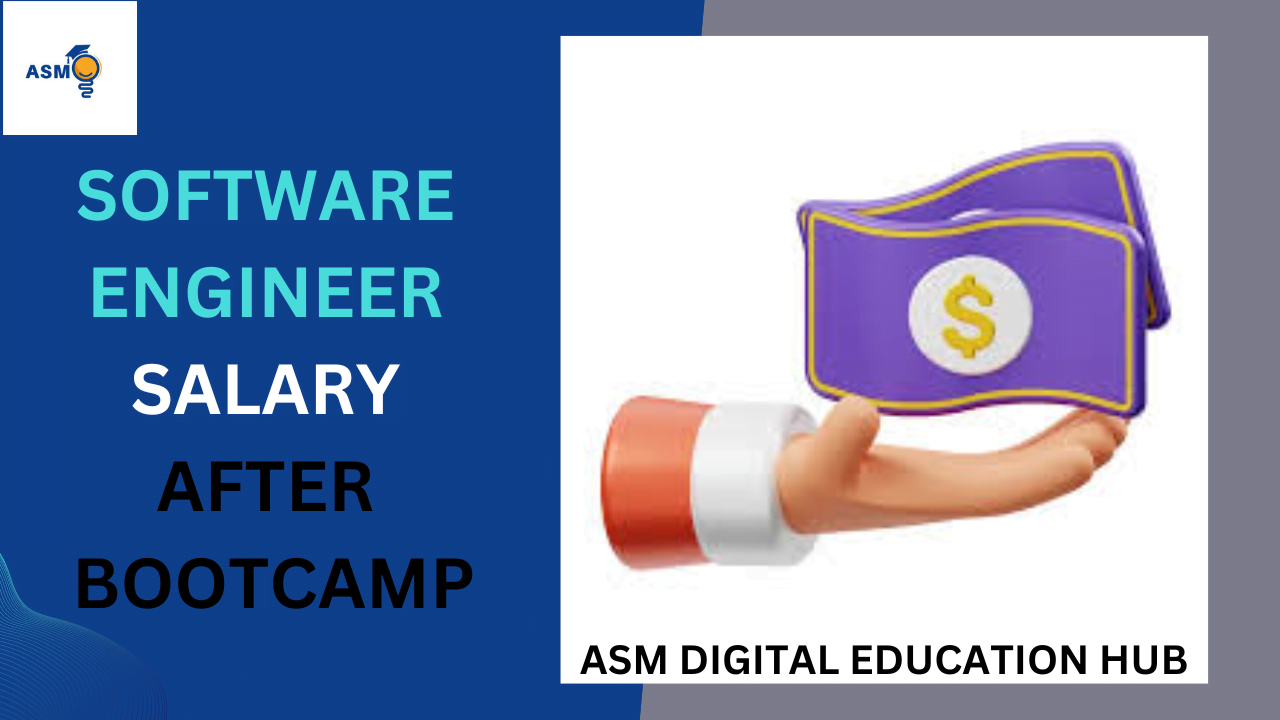#FromBootcampBoss #CodingCrushYourDebt #LevelUpYourTechLife #TechIsTheNewGold #FutureproofYourCaree
SOFTWARE ENGINEER: The tech industry is booming, and software engineers are in high demand. But breaking into this exciting field can be challenging, especially if you lack a traditional computer science degree. Enter the coding boot camp, an intensive program that equips you with the skills needed to become a software engineer in a short period. But what about the salary? Is a Bootcamp enough to land a lucrative job and achieve financial success?
SOFTWARE ENGINEER Average Salary and Its Dependencies:
The average salary for software engineers after completing a boot camp is estimated to be around $70,000 per year. However, it’s crucial to remember that this is just an average, and your actual salary can vary significantly depending on several factors:
- Location: Tech hubs like San Francisco, New York, and Seattle generally offer higher salaries than smaller cities.
- Specialization: Focusing on in-demand skills like full-stack development, data science, or cybersecurity can lead to higher pay.
- Experience: While bootcamps provide a strong foundation, additional job experience always enhances your earning potential.
- Company size and industry: Large tech companies and established firms typically offer higher salaries compared to startups or smaller businesses.
- Negotiation skills: Knowing your worth and negotiating effectively can significantly impact your starting salary.
Importance of a Bootcamp for SOFTWARE ENGINEER:
While not a magic bullet, a bootcamp offers several advantages that can boost your earning potential:
- Rapid skill acquisition: Bootcamps offer intensive training, helping you learn relevant skills quickly and efficiently.
- Portfolio building: Most bootcamps emphasize building a portfolio of projects that showcase your skills to potential employers.
- Career services: Many bootcamps offer career services like resume writing workshops, interview preparation, and job placement assistance.
- Networking opportunities: Bootcamps provide a platform to connect with other aspiring engineers and industry professionals.
Uses and Opportunities of Software Engineer:
A successful bootcamp graduate can pursue various career paths, each with its own salary potential:
- Front-end developer: Focuses on building the user interface of websites and applications.
- Back-end developer: Works on the server-side logic and data management of applications.
- Full-stack developer: Possesses both front-end and back-end skills, commanding higher salaries.
- Mobile developer: Creates applications for smartphones and tablets.
- Data scientist: Analyzes and interprets data to solve business problems.
- Software tester: Ensures software applications function properly and meet quality standards.
Beyond the Numbers:
Remember, your salary is just one aspect of your career journey. Consider other factors like job satisfaction, work-life balance, and opportunities for growth and development when making career decisions.
Conclusion:
A software engineer salary after a bootcamp can be attractive, but it’s crucial to approach your education and career with a holistic perspective. Invest in learning relevant skills, build a strong portfolio, network actively, and negotiate confidently to maximize your earning potential and achieve your career goals.
Additional Tips:
- Research different bootcamps: Compare curriculum, cost, and career services to find the best fit for your needs and budget.
- Connect with alumni: Talk to graduates to gain insights into their job search experiences and salaries.
- Build a strong personal brand: Showcase your skills and accomplishments on platforms like LinkedIn and GitHub.
- Never stop learning: Staying updated with the latest technologies is crucial for long-term success.
By taking a strategic approach and continuously developing your skills, a bootcamp can be a valuable springboard to a rewarding and financially fulfilling career in software engineering.
Bootcamp Overview
- Title: Innovative Software Engineering: Harnessing Emerging Technologies
- Duration: 8–12 weeks
- Target Audience: Aspiring software engineers, career switchers, and junior developers
- Focus: Practical exposure to cutting-edge technologies, real-world problem-solving, and innovative development practices.
Key Modules
- Foundations of Software Engineering
- Programming Basics (Python, JavaScript)
- Version Control with Git and GitHub
- Software Development Life Cycle (SDLC)
- Web Development & Modern Frameworks
- Frontend: React, Angular
- Backend: Node.js, Django
- APIs: RESTful and GraphQL
- Cloud Computing & DevOps
- Cloud Platforms: AWS, Azure, GCP
- Docker & Kubernetes Basics
- Continuous Integration/Deployment (CI/CD) Pipelines
- Data Science and AI/ML Fundamentals
- Data Analysis with Pandas
- Intro to Machine Learning (TensorFlow, PyTorch)
- Real-Time Data Processing
- Cybersecurity and Ethical Hacking
- Basics of Cybersecurity Principles
- Vulnerability Assessment and Penetration Testing
- Secure Coding Practices
- Emerging Technologies & Innovations
- Blockchain Development
- Internet of Things (IoT)
- AR/VR Development
- Capstone Project
- Build and deploy a scalable application using tools and frameworks learned.
- Collaborate in teams to simulate real-world software development.


